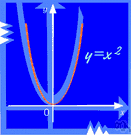al·ge·bra
(ăl′jə-brə)n.
1. A branch of mathematics in which symbols, usually letters of the alphabet, represent numbers or members of a specified set and are used to represent quantities and to express general relationships that hold for all members of the set.
2. A set together with a pair of binary operations defined on the set. Usually, the set and the operations simultaneously form both a ring and a module.
[Middle English, bone-setting, and Italian, algebra, both from Medieval Latin, from Arabic al-jabr (wa-l-muqābala), the restoration (and the compensation), addition (and subtraction) : al-, the + jabr, bone-setting, restoration (from jabara, to set (bones), force, restore; see gpr in Semitic roots).]
al′ge·bra′ist (-brā′ĭst) n.
American Heritage® Dictionary of the English Language, Fifth Edition. Copyright © 2016 by Houghton Mifflin Harcourt Publishing Company. Published by Houghton Mifflin Harcourt Publishing Company. All rights reserved.
algebra
(ˈældʒɪbrə)n
1. (Mathematics) a branch of mathematics in which arithmetical operations and relationships are generalized by using alphabetic symbols to represent unknown numbers or members of specified sets of numbers
2. the branch of mathematics dealing with more abstract formal structures, such as sets, groups, etc
[C14: from Medieval Latin, from Arabic al-jabr the bone-setting, reunification, mathematical reduction]
algebraist n
Collins English Dictionary – Complete and Unabridged, 12th Edition 2014 © HarperCollins Publishers 1991, 1994, 1998, 2000, 2003, 2006, 2007, 2009, 2011, 2014
al•ge•bra
(ˈæl dʒə brə)n.
1. the branch of mathematics that deals with general statements of relations, utilizing letters and other symbols to represent specific sets of numbers, values, vectors, etc., in the description of such relations.
2. any system of notation adapted to the study of a special system of relationship: algebra of classes.
[1535–45; < Medieval Latin < Arabic al-jabr literally, restoration]
al`ge•bra′ist (-ˈbreɪ ɪst) n.
Random House Kernerman Webster's College Dictionary, © 2010 K Dictionaries Ltd. Copyright 2005, 1997, 1991 by Random House, Inc. All rights reserved.
al·ge·bra
(ăl′jə-brə) A branch of mathematics dealing with the relations and properties of quantities. It uses letters and other symbols to represent numbers, especially in equations to solve problems or to express general mathematical relationships.
Word History For much of the Middle Ages, the center of scientific learning was not Europe, but the Islamic world of the Arabs. The Arabs studied the Greek classics of Plato and Aristotle while Europe nearly forgot about them. The Arabs were particularly interested in medicine and astronomy, and because astronomy requires making careful measurements and calculations, they became expert mathematicians. In the 800s, an Arabic mathematician named Muhammad al-Khwarizmi wrote a book called The Book of Restoring and Balancing, which explained the principles of algebra. Algebra had been developed earlier by mathematicians in Greece and India, but al-Khwarizmi's book, as the first comprehensive treatment of it, became a medieval bestseller. The Arabic word for "the restoring" in the book's title is al-jabr, which is the source of our word algebra. Al-Khwarizmi's own name is the source of another mathematical term in English, algorithm.
The American Heritage® Student Science Dictionary, Second Edition. Copyright © 2014 by Houghton Mifflin Harcourt Publishing Company. Published by Houghton Mifflin Harcourt Publishing Company. All rights reserved.
algebra
the branch of mathematics that treats the representation and manip-ulation of relationships among numbers, values, vectors, etc. — algebraic, adj.
See also: Mathematics-Ologies & -Isms. Copyright 2008 The Gale Group, Inc. All rights reserved.
ThesaurusAntonymsRelated WordsSynonymsLegend:
| Noun | 1. |  algebra - the mathematics of generalized arithmetical operations algebra - the mathematics of generalized arithmetical operationstransposition - (mathematics) the transfer of a quantity from one side of an equation to the other along with a change of sign math, mathematics, maths - a science (or group of related sciences) dealing with the logic of quantity and shape and arrangement pure mathematics - the branches of mathematics that study and develop the principles of mathematics for their own sake rather than for their immediate usefulness quadratics - a branch of algebra dealing with quadratic equations linear algebra - the part of algebra that deals with the theory of linear equations and linear transformation vector algebra - the part of algebra that deals with the theory of vectors and vector spaces matrix algebra - the part of algebra that deals with the theory of matrices |
Based on WordNet 3.0, Farlex clipart collection. © 2003-2012 Princeton University, Farlex Inc.
Translations
جَبْر، عِلْم الجَبْر
algebra
algebrabogstavregning
algebra
algebra
algebra
algebra
algebra
algebraalgebrinis
algebra
algebra
algebra
Collins Spanish Dictionary - Complete and Unabridged 8th Edition 2005 © William Collins Sons & Co. Ltd. 1971, 1988 © HarperCollins Publishers 1992, 1993, 1996, 1997, 2000, 2003, 2005
Collins English/French Electronic Resource. © HarperCollins Publishers 2005
algebra
n → Algebra f
Collins German Dictionary – Complete and Unabridged 7th Edition 2005. © William Collins Sons & Co. Ltd. 1980 © HarperCollins Publishers 1991, 1997, 1999, 2004, 2005, 2007
Collins Italian Dictionary 1st Edition © HarperCollins Publishers 1995
algebra
(ˈӕldʒibrə) noun a method of calculating using letters and signs to represent numbers.
ˌalgeˈbraic (-breiik) adjectiveKernerman English Multilingual Dictionary © 2006-2013 K Dictionaries Ltd.